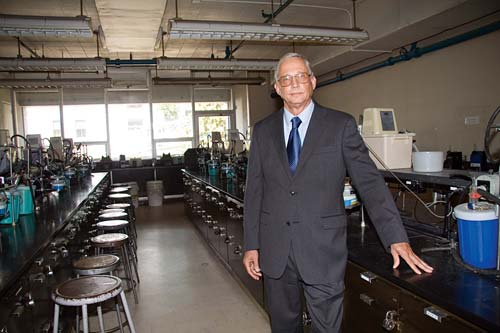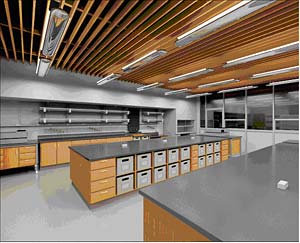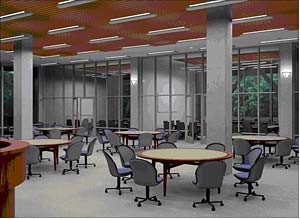 College of Chemistry Dean Richard Mathies (above), in one of the outmoded labs slated for replacement. (Michael Barnes photo)
College of Chemistry Dean Richard Mathies (above), in one of the outmoded labs slated for replacement. (Michael Barnes photo)New labs on tap for College of Chemistry
The college will rebuild its undergraduate teaching labs while it rethinks the way its students are taught
| 23 April 2009

 Above, two views of the new spaces — for instruction and discussion alike — that will be created for the college.
Above, two views of the new spaces — for instruction and discussion alike — that will be created for the college. BERKELEY — The College of Chemistry has announced plans to begin the rebuilding of its aging undergraduate teaching laboratories. The college's 17 labs, which occupy 24,000 square feet on the second and third floors of Latimer Hall, have not been renovated in nearly 50 years.
The venerable labs have been heavily used over the years. In addition to instructional demands placed on them by the college's own chemistry, chemical biology, and chemical engineering students, more than 50 percent of all Berkeley undergraduates take at least one laboratory course in the College of Chemistry before graduation.
"Chemistry is the portal to all the molecular sciences," says the college's dean, Richard Mathies. "We need to attract the best students and train them to address society's needs. Yet every time I walk by the undergraduate teaching labs, it's as if I've been teleported back 40 years to my own undergraduate days."
Along with the laboratory renewal, the college is pursuing significant revisions in the way its courses are taught. Mathies has convened a college-wide committee "to develop a vision of how to teach chemistry in the 21st century," says Matt Francis, associate professor of chemistry, who is spearheading this effort. "Chemistry now is taught in much the same way it has been for the last 50 years. This is a real opportunity to advance chemistry instruction."
To help launch the $30 million lab-renewal project, Chancellor Birgeneau has made a commitment to match donations up to at least $5 million. To date, gifts and pledges total over $500,000; members of the College of Chemistry faculty have pledged more than $334,000 of this amount.
The lab-redesign project will be completed in two phases. First, the college library in Hildebrand Hall will be renovated. Because most chemistry and chemical-engineering journals are now available online, the journal stacks will be removed, opening up space that will be reconfigured to provide three seminar rooms to support the undergraduate lab courses. Two more seminar rooms will be made available when Bixby Commons, on Latimer's ground floor, is reconfigured.
Based on current estimates, this first phase will cost less than $3 million and can be completed in 2009. Once the seminar rooms are ready, chemistry discussion sections can be separated from the actual laboratory work, allowing for more effective teaching and more efficient use of the labs.
This efficiency, in turn, will permit the start of phase two, during which one-third of the old chemistry labs will be renovated at a time; this will permit the college to maintain sufficient lab space to meet its teaching needs. This second phase may begin as early as spring 2010.
A green role model
A cornerstone of the redesign project is the integration of "green chemistry" and sustainability con-cepts into both the design of the laboratories and the new curriculum. For example, low-power fume hoods will be installed in the new labs, along with solid-state lighting and other energy-saving features.
Their new surroundings, it is expected, will motivate undergraduates and their graduate-student instructors to plan their lab work from a strong environmental perspective. In some cases, students will actively redesign old experimental protocols to improve their environmental efficiency, and will be asked to calculate their waste-disposal and carbon-emission costs as part of their experimental reports.
In addition, the college will embrace technological advances to improve the delivery of scientific training. Internet-based lectures will be used to enhance instruction in laboratory concepts and methods, while Web-based quizzes will allow students to test their understanding of difficult concepts as they learn them.
"As a result of all these efforts," says Mathies, "the College of Chemistry will remain a national role model for safe, sustainable, efficient, and inspiring laboratory education for decades to come."

